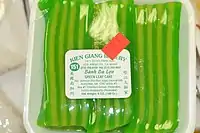Bánh da lợn
Bánh da lợn or bánh chín tầng mây or bánh da heo[1] (lit. 'pig skin cake') is a Vietnamese steamed layer cake made from tapioca starch, rice flour, mashed mung beans, taro, or durian, coconut milk and/or water, and sugar. It is sweet and gelatinously soft in texture, with thin (approximately 1 cm) colored layers alternating with layers of mung bean, durian, or taro filling.
 Bánh da lợn lá dứa green leaf cake with pandan leaves flavor | |
| Type | Layer cake |
|---|---|
| Course | Snack, dessert |
| Place of origin | South Vietnam |
| Region or state | Southeast Asia |
| Main ingredients | Rice flour, tapioca starch, mung beans, taro or durian, coconut milk or water, sugar |
| Similar dishes | Kuih lapis, Kutsinta |
Typical versions of bánh da lợn may feature the following ingredients:
- Pandan leaf (for green color) with mung bean paste filling
- Pandan leaf (for green color) with durian filling
- Lá cẩm (leaf of the magenta plant, Peristrophe roxburghiana; imparts a purple color when boiled) with mashed taro filling
In modern cooking, artificial food coloring is sometimes used in place of the vegetable coloring.
A cake called kuih lapis, which is made in Malaysia and Indonesia, is similar to bánh da lợn. In the Philippines, a similar dessert and variant of kutsinta is simply called Vietnamese kutsinta and the Khmer of Cambodia call it num chak chan (នំចាក់ចាន់).
 Bánh da lợn green leaf cake.
Bánh da lợn green leaf cake. Bánh da lợn green leaf cake with durian flavor
Bánh da lợn green leaf cake with durian flavor
See also
Notes
- The "d" in "da" is pronounced like a "z" in northern Vietnamese pronunciation and like a "y" in southern Vietnamese pronunciation.
External links
- Photo of bánh da lợn (the green cake in the center)
- Photo of bánh da lợn
- Alice's Guide to Vietnamese Banh